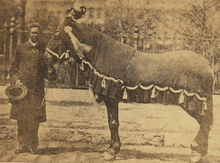Henry Brown | |
|---|---|
 1865 photo of Brown with
Old Bob at the funeral of
Abraham Lincoln | |
| Born | April 17, 1823
Raleigh, North Carolina, U.S. |
| Died | September 3, 1906 (aged 83)
Springfield, Illinois, U.S. |
| Resting place |
Oak Ridge Cemetery, Springfield, Illinois, U.S. |
| Occupations |
|
| Spouse | Mary A. King |
| Children | 5 |
Henry Brown (April 17, 1823 – September 3, 1906) was an American minister of the African Methodist Episcopal Church, abolitionist, and leader of the Underground Railroad. [1]
Early life and education
Brown was born into slavery on a plantation in Raleigh, North Carolina on April 17, 1823. [2]
In 1835 at the age of 12, Brown was separated from his family and moved to Ohio. In 1837, he was purchased as an indentured servant for a Quaker family in Indiana, where he was a farm laborer. He received his freedom through manumission at around the age of 20. [3]
Brown was self-taught through reading literature and the Bible. [2]
Career
In 1846, Brown was ordained as a minister in the African Methodist Episcopal Church. Brown was a frequent preacher at congregations in the Midwest. [4]
After moving to Springfield, Illinois in around 1848, Brown became an active leader and "conductor" in the Underground Railroad in Quincy and Springfield, assisting individuals escaping slavery and in pursuit of freedom. [3]
Brown was an active advocate for the rights of African Americans, serving as a delegate to the 1853 Illinois Colored Convention which advocated in favor of repealing discriminatory laws impacting African Americans. [5] [6]
After the American Civil War, Brown was a frequent guest speaker at public events, where he recalled memories of the war and celebrated the end of slavery in the United States. In 1873, he was the keynote speaker at Springfield's commemoration celebration of the Fifteenth Amendment to the United States Constitution. [5] [7]
Association with Abraham Lincoln
In around 1848, Brown became acquainted with Abraham Lincoln, the future President of the United States. [8] To supplement his "meager" income as a preacher, [9] Brown worked for Lincoln and his family for over 12 years, serving in various roles as a handyman, shoemaker, and assistant until Lincoln and his family moved to Washington, D.C. in 1861 after he was elected President. [10] [11] Brown remained a friend of the Lincoln family after they moved. [12]
After Lincoln's death in 1865, Brown received a telegram from the Lincoln family requesting that he take part in Lincoln's Springfield funeral procession. [13] [14] Brown was given the task of leading Lincoln's beloved driving horse, " Old Bob," in the procession, whose spot was immediately behind the hearse and in front of the carriage carrying Robert Todd Lincoln. [15] [16] [17]
Personal life
In 1847, Brown married Mary A. King in Paris, Illinois. They had five children, including a son, Thomas, who became one of the first African Americans admitted to practice law in Illinois. [1]
Death
Brown died in 1906 at the age of 83. [18] He is interred at Oak Ridge Cemetery in close proximity to the Lincoln Tomb. [3]
Legacy
The "Henry Brown Lodge No 22" Masonic lodge in Peoria, Illinois is named after Brown. [19] [20]
Brown has been portrayed by reenactors of the Lincoln funeral procession. [21]
References
- ^
a
b
History of Sangamon County, Illinois. The Library of Congress. Chicago, Inter-state publishing company. 1881. p. 736.
{{ cite book}}: CS1 maint: others ( link) - ^ a b Paull, Bonnie E.; Hart, Richard E. (2020-09-07). Lincoln's Springfield Neighborhood. Arcadia Publishing. p. 107. ISBN 978-1-62585-532-9.
- ^ a b c "Rev. Henry Brown". Sangamon County Historical Society. 2013-10-31. Retrieved 2022-12-02.
- ^ "Reverend Henry Brown – the man who led the riderless horse in President Lincoln's funeral procession". The Log Cabin Sage. 2019-04-24. Retrieved 2022-12-02.
- ^ a b "Henry Brown - Individuals". www2.illinois.gov. Retrieved 2022-12-02.
- ^ "The Illinois Colored Convention of 1853". Black Organizing in Pre-Civil War Illinois: Creating Community, Demanding Justice. Retrieved 2022-12-02.
- ^ "Henry Brown". Black Organizing in Pre-Civil War Illinois: Creating Community, Demanding Justice. Retrieved 2022-12-02.
- ^ Field, Ron (2017-10-19). Silent Witness: The Civil War through Photography and its Photographers. Bloomsbury Publishing. ISBN 978-1-4728-2278-9.
- ^ Craughwell, Thomas J. (2009-06-30). Stealing Lincoln's Body. Harvard University Press. p. 26. ISBN 978-0-674-02997-2.
- ^ Blumenthal, Sidney (2016-05-10). A Self-Made Man: The Political Life of Abraham Lincoln Vol. I, 1809 – 1849. Simon and Schuster. p. 331. ISBN 978-1-4767-7725-2.
- ^ Burlingame, Michael (2013-04-01). Abraham Lincoln: A Life. JHU Press. p. 825. ISBN 978-1-4214-1068-5.
- ^ Steers, Edward (2005-10-21). Blood on the Moon: The Assassination of Abraham Lincoln. University Press of Kentucky. p. 290. ISBN 978-0-8131-9151-5.
- ^ "Lincoln lies in state, Springfield, May 1865". Google Arts & Culture. Retrieved 2022-12-02.
- ^ "Reverend Henry Brown with Abraham Lincoln's Horse, "Old Bob," on Lincoln's Funeral Day, Springfield, Illinois, 1865 - The Henry Ford". www.thehenryford.org. Retrieved 2022-12-02.
- ^ Algeo, Matthew (2015-04-01). Abe & Fido: Lincoln's Love of Animals and the Touching Story of His Favorite Canine Companion. Chicago Review Press. ISBN 978-1-55652-383-0.
- ^ Furgurson, Ernest B. "This is the Carriage That Took Lincoln on his Fateful Trip to Ford's Theatre". Smithsonian Magazine. Retrieved 2022-12-02.
- ^ Picone, Louis L. (2020-02-04). The President Is Dead!: The Extraordinary Stories of Presidential Deaths, Final Days, Burials, and Beyond (Updated ed.). Simon and Schuster. p. 110. ISBN 978-1-5107-5454-6.
- ^ “Negro Employed by Lincoln Dead,” Illinois State Journal (Springfield), Sept. 4, 1906
- ^ Rice, James Montgomery (1912). Peoria City and County, Illinois: A Record of Settlement, Organization, Progress and Achievement. S. J. Clarke. ISBN 978-0-608-36869-6.
- ^ Polk's Peoria City Directory. R. L. Polk & Company. 1913. p. 1732.
- ^ "Illinois will relive Lincoln's assassination and funeral". Los Angeles Times. 2015-04-11. Retrieved 2022-12-02.